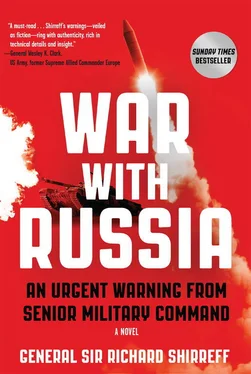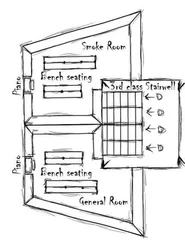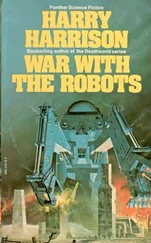He’d helped push through the cuts in escort frigates and destroyers, in order to find the money to finish building the over-budget and much-delayed carriers. The last government had concluded that it was politically more acceptable to scrap small surface ships than declare the carriers to be “white elephants” and scrap them. Bush had a certain sympathy for Narborough on that near impossible call; any naval officer formally advising the scrapping of the iconic carriers would be dead Navy meat.
It was therefore no surprise when he was rewarded with the command of Queen Elizabeth , the most prestigious command the Royal Navy had to offer.
“What ho, Number One,” said Narborough. “How are things going?”
Bush sat down in the proffered chair and pulled out his notebook.
“I’ll give you a detailed state of play at this evening’s O Group, Sir, when the Heads of Department will also brief. Right now, Warfare, Supply and Marine Engineering are on track. I’ll be happier when Weapons Engineering sort out the problems with the Phalanx anti-missile system. But the big issue is aircraft.”
“Continue,” said Narborough.
“Sir.” Bush took a deep breath. “You’re not going to like what I have to say, but I’ll say it anyway.” This would not be the first time he had spoken bluntly to a senior officer, hence, despite his highly successful command tour on a frigate, his reduced chances of commanding anything else. “But to take a carrier to sea to fight the Russians, without the aircraft which are its principal weapons system, is asking for trouble.”
Bush was a seaman to his core, but he’d kept a watchful eye on the F35B Lightning II joint-strike program, was well briefed on the cost overruns and delays to the program, and was aware of the technical glitches with both software and hardware that had delayed their introduction into service.
“Now listen, Number One.” Narborough smoothed back his hair. “I told you this morning that we’re deploying as the flagship of a Littoral Maneuver Group. Our task is to sail for the Baltic and be ready to poise off shore to demonstrate the resolve and determination of the British government and the NATO Alliance to face down the Russians and, above all, to stop them trying anything else on. Our masters accept they’ve got the Baltic states by the short and curlies and there’s not a lot anyone can do about it. But we can stop them going any further. We may not have any Lightning IIs, but we’ll have an impressive mix of helicopters and be able to pack quite a punch ashore with the Marines if needs be… and let’s get this straight, nobody has said anything about actually fighting the Russians.”
Bush knew that to push the issue any further would amount to insubordination. He’d expressed his concern with the mission they’d been given and he now had two basic choices. Turn to the right and get on with it, or resign his commission in protest. But to do the latter on the verge of a possible war would be tantamount to cowardice.
However, he tried one more tack. With just nineteen frigates and destroyers left in the Royal Navy after the last round of defense cuts, Bush knew that the Task Group would be lucky to get more than a handful of escorts to provide the all-important anti-submarine and anti-aircraft defense systems needed to ensure the protection of Queen Elizabeth . Some were in long-term, planned refit, others in dock for servicing and repairs, yet others in far-flung parts of the world, and while they might be making best speed to return, they would not be back in time to join the Task Group before it sailed. Back when the Royal Navy had a fleet of some size they had always been able to make do when a crisis unexpectedly erupted. Now the navy was so small—“lean” was a favorite expression spouted by politicians trying to sell a negative as a positive—there was no longer anything to spare in the cupboard.
“Sir, are you happy with the makeup of the Task Group?” he asked Narborough.
The Captain narrowed his eyes. “What’s bugging you, Number One?” he demanded in his high-pitched, nasal voice. “We’ll have the amphibious ship Bulwark with a Royal Marine Commando on board along with us. I’d hoped for the second amphibious ship, Albion , as well, but sadly… well… you know how it is. After the last round of cuts we can’t man both of them as well as the carrier any longer. As for escorts, Fleet HQ has promised two Type 45s: Daring and Dauntless . They’re the most capable destroyers ever launched, as well as the world’s best air-defense ships. Our anti-submarine protection will be provided by the hunter-killer sub Astute —and there’s no better way to defend against subs than with another sub. Our anti-sub escorts will be two Type 23s: Kent and Lancaster . So, together with our two Royal Fleet Auxiliaries for logistic support, I reckon we’ll be quite a punchy Task Group.” Narborough looked pleased.
Bush knew his time was running out but decided to press on, although he knew when to concede a point.
“I get the point about the Type 45s and Astute , Sir. Nevertheless, however good the Type 45 anti-aircraft capabilities are, there are only two of them—and let’s not forget that they can only ever be a backstop at best. It’s the Lightnings we haven’t yet got which are meant to be our first line of air defense. So we’re cutting it very fine. As for the Type 23s: only two anti-submarine frigates is taking a real risk with the depth and balance of our anti-submarine protection screen, particularly as we’ll be up against the Russian Kilos. They’ve got plenty of them and the new generation is top class. If they send a few of those after us, we will have real problems trying to track them all, especially without maritime patrol aircraft and only one hunter-killer sub. The Nimrods may have been old, but they did the job.”
“What are you trying to say, Number One?” Narborough was on the verge of getting cross, but Bush also knew that the Captain had a grudging respect for him. While unlikely to translate into an unambiguous recommendation for command, he knew that the canny, upward-thrusting Commodore listened to him.
“You’re commanding the Navy’s biggest-ever ship. We’ll have over two thousand on board with our crew and the commandos. You and this ship are the pride of the Navy. But if we went to the bottom, it would be as big a disaster as Repulse and Prince of Wales being sunk by the Japanese in 1941… You’ll be remembered forever as the unlucky captain. And the name Narborough—”
“Enough.” The Captain held up his hand and smiled and Bush knew he had got away with it as Narborough, with his typical arrogance, assumed that it was his own good name he was worried about, rather than the safety of the ship and its crew. In fact, Bush realized in a moment of grim humor, he had probably just done what was needed to get an “outstanding” on his next Annual Report. Next moment his guess was confirmed.
“But don’t think I don’t appreciate your concern, Number One. It’s been noted. Relax. It’s not going to happen. The Russian navy has never recovered from the rusting hulks in Murmansk after the Cold War. It’s manned by conscripts. They’d never dare come near us. Now, I’ll see you at the O Group at 1900 hours.”
Bush had said what needed to be said and knew he could go no further. He stood up and saluted.
“Aye aye, Sir.”
Bush left the Captain’s day cabin. Fat lot of good that did , he thought, but someone had to say it .
Bush decided to walk the ship again, talk to the sailors who were making things happen and get a feel for the atmosphere. As he emerged into the huge space of the hangar deck, a scene of frantic activity met him. Pallets of stores were being unloaded from trailers by working parties of sailors, while the Viking armored vehicles, Land Rovers and light guns of the Army’s commando gunners were being parked along the sides of the hangar to make space for incoming helicopters. At the heart of it all, directing, cajoling and gripping any slackers, Bush saw Executive Warrant Officer Geordie Rae, the senior Warrant Officer on board and a man who knew better than anyone how the lower deck ticked. I’ll get the truth from him, Bush said to himself, making his way through the chaos.
Читать дальше












